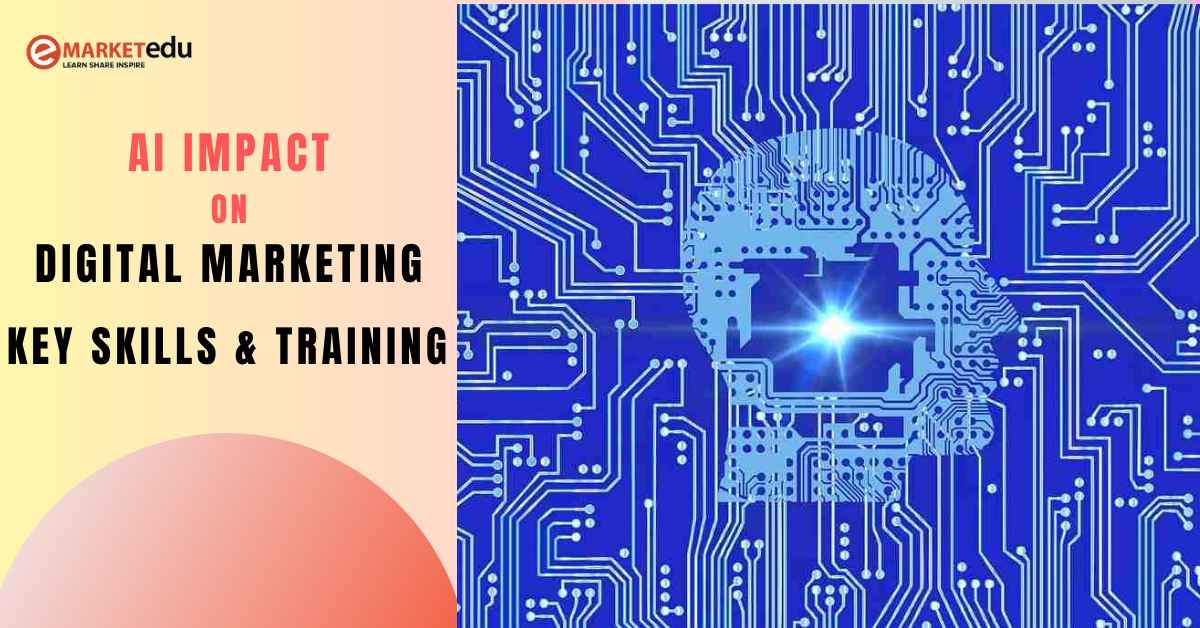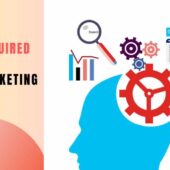Table of Contents
ToggleImpact of AI in Digital Marketing – Key Skills, Training for Professionals
“The playing field is poised to become a lot more competitive, and businesses that don’t deploy AI and data to help them innovate in everything they do will be at a disadvantage.” — Paul Daugherty, CTIO Accenture
At present, Artificial Intelligence (AI) has become one of the central aspects of various industries, reshaping traditional approaches to business operations. Digital marketing stands out as one of the most transformed ones among these. AI in digital marketing is giving us new concepts on how businesses should communicate with their audiences, optimize their campaigns, and analyse customer behavior. This change represents not merely a trend but a profound shift in direction in the marketing landscape that every digital marketing or business internet marketing professional must adapt in order to stay relevant and competitive.
In this regard the need to acquire new skills and knowledge is more pressing than ever. Through recognizing the benefits and finding ways to merge AI and automation into your digital marketing strategies can open doors to exciting new possibilities and ensures that professionals remain dynamic and significant in an increasingly automated and data-driven world.
The Impact: AI in Digital Marketing Corporate Training
AI has redefined digital marketing by automating tasks that once required hours of manual work. Be it content creation or customer service activities, AI tools have streamlined processes, allowing marketers to focus on more strategic initiatives. However, the change goes deeper than automation; AI has empowered marketers to deliver highly personalized experiences at scale, using vast amounts of data that would otherwise be impossible to process manually.

Beyond Segmentation: Personalization at Scale
There is no need for marketers to rely solely on demographic segmentation. AI has improved personalization to a new level, enabling real-time customization based on user behavior. AI-powered algorithms can analyse a customer’s interactions on website or media, predict future actions, and deliver personalized content or product recommendations instantly.
Consider Netflix for an example. The platform uses AI to recommend shows based on your viewing history, the duration of your watch time, and even preferences of similar users, creating a highly tailored experience. This hyper-personalization isn’t limited to entertainment—it has become the basis of digital marketing promotions, enabling businesses to forge deeper connections with their audiences.
It is here that a slight inconsistency emerges. While AI can certainly personalize experiences at an unprecedented scale, some consumers may find this level of customization intrusive, creating privacy concerns. Marketers must walk carefully, balancing personalization with respecting user privacy—a growing challenge in today’s data-sensitive world.
Predictive Analytics
Predictive analytics powered by AI allows marketers to forecast future trends and behaviors accurately. Through analysis of historical data and real-time inputs, AI models can predict customer churn rates, purchase likelihoods, and even the effectiveness of different marketing campaigns before launch. This predictive capability enables marketers to make informed decisions that optimize their strategies for maximum ROI.
Automated Content Creation (Automation in Digital Marketing)
A significant impact of AI in digital marketing lies in its ability to create automated content. AI-powered tools are now capable of generating blog posts, social media captions, and product descriptions, helping marketers save time and resources. For instance, GPT-based content generators can produce coherent articles with minimal human involvement by analyzing existing content, learning from it, and creating relevant pieces that reflect a brand’s voice and tone.
However, while AI-generated content is beneficial, it also presents certain challenges. The emotional depth and creativity in human writing remain difficult to replicate through AI alone. AI here allows marketers to scale content production, but the final touch often needs human intervention to ensure it resonates emotionally with the audience. So, professionals must learn to balance automation in digital marketing with human creativity—a fine line to walk.
Chatbots and Customer Service
AI-driven chatbots have completely changed the customer service scenario through 24/7 support without human involvement. Leveraging Natural Language Processing (NLP), these chatbots can understand and respond effectively to customer inquiries. They manage tasks ranging from basic FAQs to more complex issues that may require escalation to human agents efficiently. This capability enhances customer satisfaction while reduce operational costs for businesses simultaneously. Thus, pushing businesses into an era of brand-new customer service philosophy.
Monitoring of Social Media Activities
In today’s digital age, social media monitoring is very important. Here reputation of a company can be made or broken overnight. AI tools can monitor social media platforms in real time to identify trends, analyse sentiments, and inform about potential crises before they escalate. This proactive capability allows marketers to respond swiftly and reduce any negative impact on their brand.
Key Skills for Digital Marketers in an AI-Powered Landscape
As AI in digital marketing reshapes the field, professionals must acquire new skills to remain competitive. Relying solely on traditional marketing expertise is no longer enough in today’s landscape. Professionals must now develop technical and strategic expertise to thrive in this AI-driven landscape.

Data Analysis and Interpretation Skills
Data power AI and the ability to interpret this data have become essential skills in digital marketing. Marketers must learn how to gather, analyse, and understand high volumes of data to make appropriate decisions. While AI can analyse vast amounts of data, it is the responsibility of professionals to extract actionable insights from it. Understanding consumer behavior, market trends, and campaign performance metrics requires a sound knowledge of data analytics.
The emotional connection here is clear: data may be numbers, but behind those numbers are real people—customers, each with unique preferences and needs. Marketers who can comprehend and depict the data into personalized strategies will build more sustainable connections with their audience.
Technical Proficiency: AI Tools and Platforms
Proficiency with AI platforms and tools is essential for today’s digital marketing professionals. From chatbots that manage customer inquiries to AI-powered CRM systems that track user engagement, marketers need to effectively utilize these platforms. Solutions like HubSpot, Salesforce Einstein, and Hootsuite Insights provide AI-based insights that enable campaign optimization.
However, understanding these tools extends beyond knowledge of usage—it involves integrating them into broader digital marketing strategies. Therefore, marketers must be adaptable to evolving technology and committed to continuous learning. Additionally, having basic coding skills in languages such as Python or R can help customize AI tools to meet specific marketing needs.
Creative Strategy
Despite AI’s growing role in automating tasks in digital marketing field, the human touch remains irreplaceable, especially in creative strategy part. AI can generate content, but still lacks the emotional engagement. The nuance and emotional appeal of creative marketing still largely depend on human input. Professionals who excel in blending AI’s capabilities with their own creativity will be the ones who thrive in the future of digital marketing. Hence automation in digital marketing should be complement with creative strategy and human emotions.
Ethical Awareness
As AI in digital marketing continues to expand, ethical considerations become increasingly crucial. Digital professionals need to learn how to use AI responsibly. They must ensure transparency in data collection processes, avoid algorithm biases, and respect privacy rights of the audience.
Training & Development for Corporate Digital Learning
To remain competitive and relevant, digital professionals must invest in continuous learning and upskilling. Various training programs are available in the market to help them develop the necessary skills and channelize AI effectively in digital marketing efforts.
In this regard, you can check our Best Digital Marketing Courses in Bangalore
Some of these suggested courses are
AI-Powered Marketing Courses: Cover topics such as machine learning, predictive analytics, and AI-driven campaign strategies.
Data Analytics Certifications: Earning a certification in data analytics, such as Google’s Data Analytics Professional Certificate, equips marketers with the skills to analyse and interpret data, a critical component of AI-driven marketing.
You may check our GTM Course and Adobe Analytics Training Course here.
AI Tool Training: Many AI platforms provide their training resources.
It is crucial to stay ahead of the curve through continuously developing new skills that complement AI’s capabilities. The digital marketing landscape is evolving rapidly, and those who invest in learning and professional development today will lead the industry tomorrow.
Embracing the Future of Digital Marketing
In conclusion, Artificial Intelligence, AI in digital marketing is no longer just a catchy word or term; it is transforming the industry from square one. From automation in digital marketing tasks to delivering personalized customer experiences, AI offers unprecedented opportunities for professionals to enhance their campaigns and strategies. However, the human element remains critical—creativity, emotional engagement, and ethical considerations must go hand in hand with AI-driven efficiency.
For digital marketing professionals, the future is bright, but they need to learn and adapt. Through acquiring essential and relevant skills such as data analysis, AI tools, creative strategy etc, professionals can employ the full potential of AI while staying true to the core aspects of human connection and creativity. In today’s rapidly evolving digital arena, the influence of AI is undeniable, yet the human touch remains indispensable.
At eMarketEdu, we offer tailor-made digital marketing training programs designed to address the specific requirements of corporate teams as well as individual professionals. Contact us today to learn more about how we can assist you to achieve digital marketing success!
Also read our most loved posts related to – Digital Marketing:
AI in Digital Marketing: Transforming Corporate Strategies and Growth
Exponential Rise of Videos: Corporate Video Marketing Effective Usage






